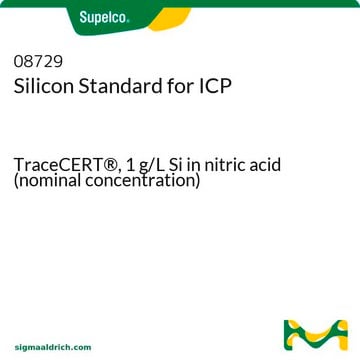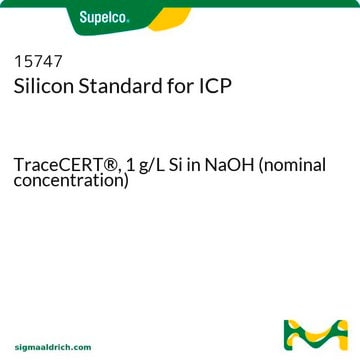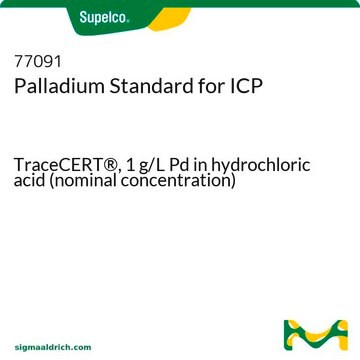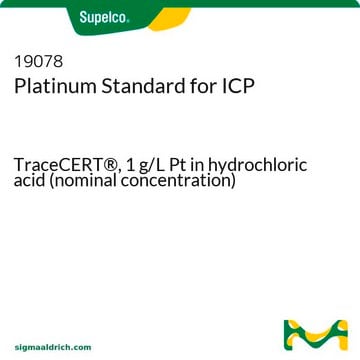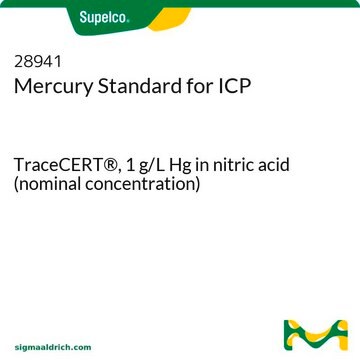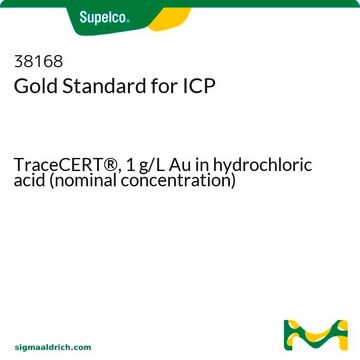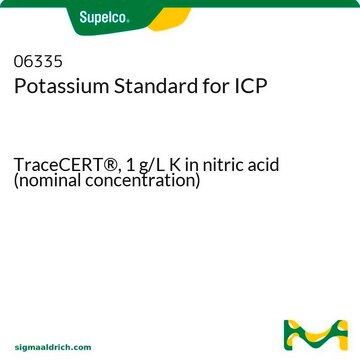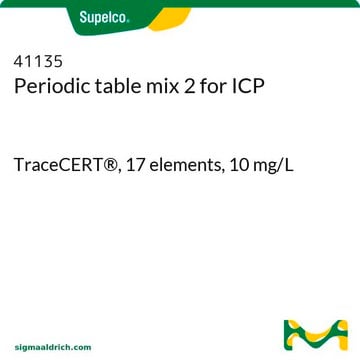1.70338
Osmium ICP standard
(NH₄)₂OsCl₆ in HCl 7% 1000 mg/l Os Certipur®
Synonym(s):
Osmium Calibration Standard for ICP
Sign Into View Organizational & Contract Pricing
All Photos(1)
About This Item
UNSPSC Code:
41116107
NACRES:
NA.24
Recommended Products
grade
certified reference material
Quality Level
product line
Certipur®
technique(s)
ICP: suitable
density
1.034 g/cm3 at 20 °C
application(s)
industrial qc
pharmaceutical
format
single component solution
storage temp.
15-25°C
Related Categories
General description
This certified reference material (CRM) is produced in accordance with ISO 17034 and characterized in accordance with ISO/IEC 17025. This CRM is traceable to SI unit kg and measured against primary material from a National Metrology Institute (NMI), e.g. NIST.
Please visit ISO certificates and Site Quality Self-Assessments to access the current certificates of accreditation.
Download your certificate at http://www.sigma-aldrich.com to view certified values, including uncertainty, date of expiry, and detailed information about trace impurities.
Please visit ISO certificates and Site Quality Self-Assessments to access the current certificates of accreditation.
Download your certificate at http://www.sigma-aldrich.com to view certified values, including uncertainty, date of expiry, and detailed information about trace impurities.
Application
The osmium ICP standard may find the below uses:
- To study the spatial distribution of isosteric osmium and ruthenium anticancer agents using laser ablation-inductively coupled plasma-mass spectrometry (LA-ICP-MS)
- Determination of osmium by inductively coupled plasma-mass spectrometry (ICP-MS) after pressure vessel digestion with nitric acid
- Development of a plasma induced vapor generation method to measure osmium in solutions by inductively coupled plasma-optical emission spectrometry (ICP-OES)
- Study of serum-binding properties of two metallodrugs by size exclusion chromatography-inductively coupled plasma-mass spectrometry (SEC-ICP-MS)
- Detection of osmium by Photochemical Vapor Generation-Inductively Coupled Plasma-Mass Spectrometry(PVG-ICP-MS)
- Inductively coupled plasma-optical emission spectrometric (ICP-OES) determination of osmium by using photooxidation vapor generation (POVG) method
Other Notes
For a complete product listing of our Certipur® range of CRMs for ICP and AAS, technical information, and example certificates please visit our ICP & AAS standards website
Legal Information
CERTIPUR is a registered trademark of Merck KGaA, Darmstadt, Germany
Signal Word
Warning
Hazard Statements
Precautionary Statements
Hazard Classifications
Met. Corr. 1
Storage Class Code
8B - Non-combustible corrosive hazardous materials
WGK
WGK 2
Flash Point(F)
Not applicable
Flash Point(C)
Not applicable
Certificates of Analysis (COA)
Search for Certificates of Analysis (COA) by entering the products Lot/Batch Number. Lot and Batch Numbers can be found on a product’s label following the words ‘Lot’ or ‘Batch’.
Already Own This Product?
Find documentation for the products that you have recently purchased in the Document Library.
Customers Also Viewed
Serum-binding properties of isosteric ruthenium and osmium anticancer agents elucidated by SEC-ICP-MS
Klose M, et al.
Monatshefte fur Chemie / Chemical Monthly, 149(10), 1719-1726 (2018)
Bioimaging of isosteric osmium and ruthenium anticancer agents by LA-ICP-MS
Klose M, et al.
Metallomics : Integrated Biometal Science, 10(3), 388-396 (2018)
Pharmacopeial requirements for elemental impurities: a novel approach to the trace determination of osmium by oxidative pressure vessel sample digestion and measurement using inductively coupled plasma mass spectrometry (ICP-MS) after complexation and stabilisation
Venzago C, et al.
Journal of Analytical Atomic Spectrometry, 28(7), 1125-1129 (2013)
Simultaneous Detection of Ruthenium and Osmium by Photochemical Vapor Generation-Inductively Coupled Plasma-Mass Spectrometry
Yang Q, et al.
Analytical Chemistry (2021)
High-efficiency photooxidation vapor generation of osmium for determination by inductively coupled plasma-optical emission spectrometry
Zhu Z, et al.
Journal of Analytical Atomic Spectrometry, 29(3), 506-511 (2014)
Our team of scientists has experience in all areas of research including Life Science, Material Science, Chemical Synthesis, Chromatography, Analytical and many others.
Contact Technical Service

